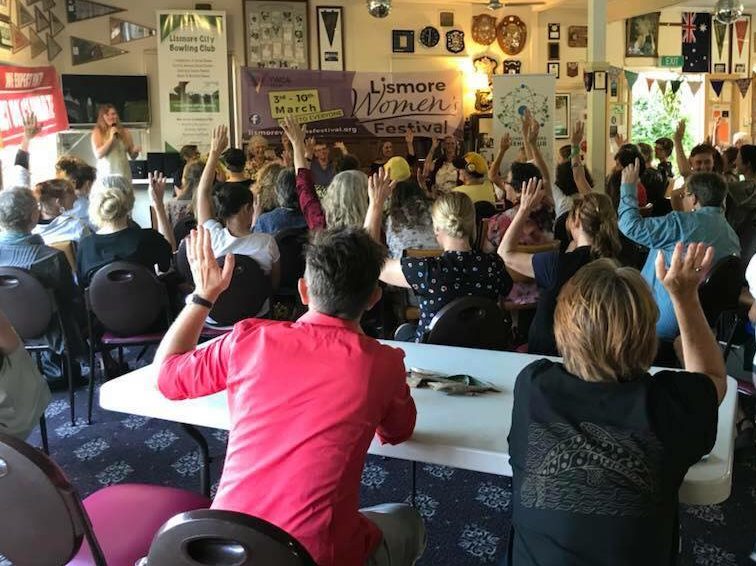It’s a familiar situation.
You’re at a forum, seminar or conference and the MC opens up for questions. Out of nowhere a man steps up, strongly opinionated, ready to pose a question – or perhaps offer their own perspective as a comment, prompting the MC to enquire ‘do you have a question?’
There follow more questions and you can’t help noticing more men get a say than women. At one forum I attended there were five questions in total, not one of them from a woman.
Why does this happen?
- The Patriarchy!
- Male and female socialisation. Growing up in a society defined by systemic sexism and rigid gender categories means that men have experienced years of being told they have a right to take up space and women have been told they don’t. Women often feel they should only contribute if they have something really important to say and can have a distorted perspective of whether their own contributions are important. Men tend to have more of a sense that they will be listened to and their contributions are valuable even if they’re still half formed. These are massive generalisations but there is enough truth in them to be evident in pretty much all public debates.
- The speaking list default. Many facilitators or MCs go with the approach of calling on people in the order they have put themselves forward without considering this critically. I don’t believe that how quickly someone puts their hand up is the most important definer of whether they get to speak or when. An orderly queue is not more important than equity and inclusion.
- Gender bias on behalf of the facilitator. It may sometimes be the case that the facilitator is calling more on men than women, although there are plenty of women wishing to speak. In the forum I mentioned where no women got to ask a question there were women with their hands up. A woman was MCing but a man was the one taking the microphone to participants and he was choosing the men.
What is the consequence?
- Women aren’t heard.
- Less quality discussion. The gathering misses out on women’s important contributions.
- Demoralisation and compounding inequity. Women (and everyone else) experience another time when women aren’t visible and centred – and we haven’t even gone into who was on the panel or speaking at the event.
What can we do?
As participants
- Men can self-faciliate to step back. Consider: What will happen if you don’t get to speak? Is there another way you could find out that information or share your perspective? Would it be ok if you didn’t?
- Women can step up. Even if it feels uncomfortable you can decide it’s important for your voice to be heard. If it helps, remember that speaking up will make a difference to other women in the room.
- Women can be strategic. Pay attention to how to get heard, make your way to the microphone and put your hand up strongly.
- Speak up for gender balance. If you notice men over-participating and the facilitator not picking up on it you can intervene eg ‘I notice a lot of men are speaking. Can we bring some women up the speaking list?’ I have done this in a forum where I noticed that 6 out of the first 7 questions came from men.
As facilitators
- Hold a paired buzz before opening for questions. When speakers have finished you could say ‘Before we move to questions let’s take a few minutes to process what we’ve heard. Turn to someone sitting next to you and have a quick conversation about what’s on top from listening to our speakers. See if there’s a question you’d like to ask when we regroup’. This gives people time to get their thoughts in order and allows them to practice what they will say, making it less daunting to speak in the large group. It allows everyone else to catch up with the strongly opionated man who has been ready with his question potentially before the speakers started. It also means people desperate to be heard or who feel entitled to be heard have another way of having their needs met other than speaking in the large group. Plus many more people get to share their thinking with someone else compared to the small number of people who get to ask a question or comment in the large group.
- Intentionally call on women. Take your first question from a woman. This makes space for more women to put themselves forward and sets the tone for the discussion.
- Don’t use a speaking list based on the speed of people putting their hands up. Ask for everyone who has a question to raise their hands. Allow enough time for people who may experience barriers to speaking to really consider putting themselves forward (or ask the question again part way through the time to give people another chance). Then alternate calling on women and men.
- Mix it up. One technique I’ve found useful is to see if there are questions in segments of the room ie ‘does anyone in the front left have a question?’ etc. Breaking the room down seems to encourage unusual suspects, and it also makes it easier to alternate men and women without labouring the point.
- Actively encourage women to ask questions. For example ‘I notice we’ve heard from a few men already. Would any women like to ask a question?’ or ‘I’ll take the next question from a woman’.
- Examine unconscious bias. Studies show that people think women are dominating the discussion if they are speaking 50% of the time, which means there can be a perception of equal participation when women are far from 50% of contributors. Sexism and internalised sexism can mean men get viewed as more authorative, legitimate or valuable in the discussion. Reflecting on our practices as facilitators and making conscious decisions in the direction of equity and inclusion can have a significant impact on the groups we work with.
Please note:
The emphasis on ‘men’ and ‘women’ in this article is not intended to imply there are only two genders – but it is intended to address the fact that there are established dynamics of oppression and privilege that operate along these lines, according to these identities and lived experiences.
We can’t always tell from looking at people if they are men, women, trans or gender non-conforming. Be aware of this when calling on people and use non-gendered language.
Many of these tips can also be applied to other areas of privilege and oppression such as race and age.
 About the author
About the author
Holly Hammond is Plan to Win’s founder, director and principal facilitator and trainer. She is also the founder and co-convenor of the Melbourne Campaigners’ Network and Plan to Thrive and lead facilitator of the Women’s Environmental Leadership program. Holly has been facilitating groups since she first became politically active at high school in the early 1990s.
Main photo: Maddy-Rose Braddon facilitating at the Lismore Women’s Festival in 2018.
What have you figured out about facilitating for gender balance? Additional strategies are very welcome.

